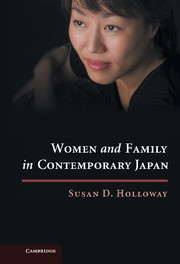6 - Husbands: Crucial Partners or Peripheral Strangers?
Published online by Cambridge University Press: 05 June 2012
Summary
My husband is not like one of those fathers who work too hard and do not even care about their kids.… He does everything. I cannot think of anything else he should do as a father. He takes Kaito [their son] with him everywhere he goes.
(Asako, high school educated, high self-efficacy mother of two)Before we were married, I was thinking we could probably share the housework. But I gave up on that eventually. He stopped helping me, knowing I would do everything.… He does not do a thing, even if I ask. That's why I have come to expect nothing from him.
(Junko, high school educated, low self-efficacy mother of two)The diary of Makiko Nakano, the wife of a pharmacist living in Kyoto, provides a fascinating glimpse of married life in 1910, when the modern family structure was taking shape in Japan (Nakano, 1995). In her diary, Makiko describes the challenges of being a young wife who must learn the ways of a new household. Married for four years, she portrays herself as a novice who has yet to learn how to be a good household manager. Her well-intentioned efforts sometimes meet with criticism from her husband and mother-in-law, leaving her feeling hurt and disappointed, but she always tries to learn from her mistakes. In one passage from the diary she describes an incident in which she attempts to prepare a special dish – frozen tofu – for her husband.
- Type
- Chapter
- Information
- Women and Family in Contemporary Japan , pp. 92 - 116Publisher: Cambridge University PressPrint publication year: 2010



